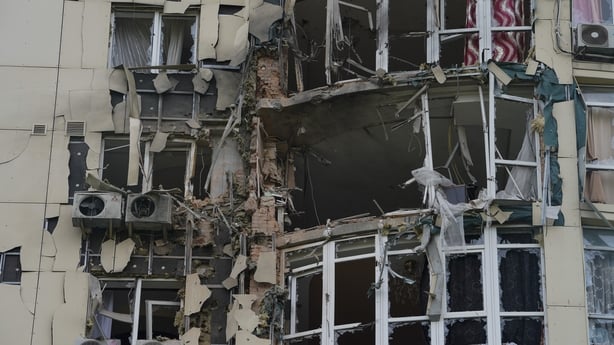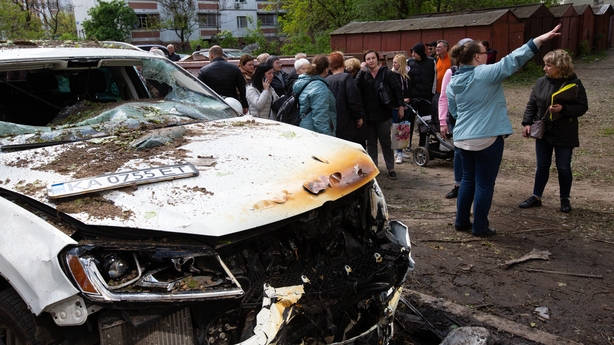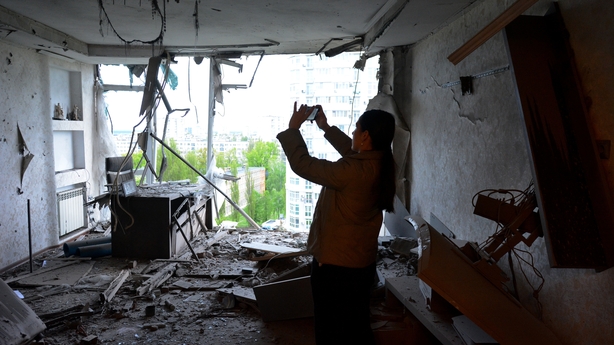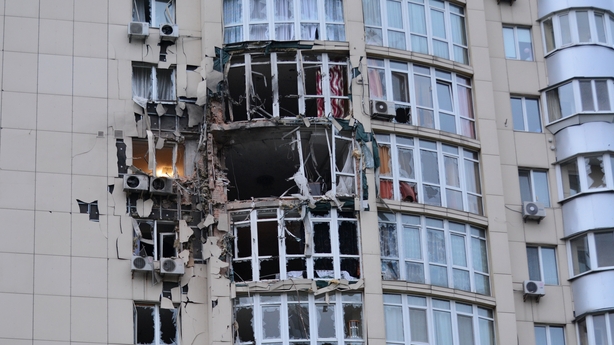The head of Russia's mercenary Wagner group has said his troops are beginning to receive ammunition needed to press their advance to capture the long-besieged eastern Ukrainian city of Bakhmut.
"Today, the groups advanced a maximum of 130 metres ... Fierce fighting is going on, but the groups are continuing to advance," Yevgeny Prigozhin said in an audio message posted on social media.
"According to preliminary data, we are starting to receive ammunition. We have not (yet) seen it in practice."
Mr Prigozhin said Ukrainian forces were confined to an area of about 2.36sq/km in the town.
Bakhmut has been under Russian attack for more than nine months, with Wagner spearheading repeated attempts to advance on what once was a city of 70,000.
Ukrainian commanders have vowed to keep their hold on the city despite a Russian drive to take it in time for Tuesday's Victory Day holiday marking the defeat of Nazi Germany.
Mr Prigozhin last week threatened to pull his forces out on 10 May unless they received the ammunition they needed, but subsequently withdrew the threat.

It comes as Russia launched its biggest swarm of drones for months against Ukraine today.
Kyiv's mayor said Russia had fired 60 Iranian-made kamikaze drones at Ukrainian targets, including 36 at the capital, all of which had been shot down. Debris hit apartments and other buildings, injuring at least five people in the capital.
A food warehouse was set ablaze by a missile in the Black Sea city of Odesa, where officials reported three people were injured.
It was the biggest drone swarm yet in a renewed Russian air campaign unleashed 10 days ago after a lull since early March.
Kyiv said Moscow was also making a final push to try to capture the ruined eastern city of Bakhmut, to deliver President Vladimir Putin what would be his only prize for a costly Russian winter offensive, in time for Victory Day.

Moscow is preparing for tomorrow's Victory Day parade, the most important day in the calendar for Russia under Mr Putin, who uses the 1945 Soviet triumph over Nazi Germany to justify his invasion of Ukraine.
In a new break with Russia, President Volodymyr Zelensky marked Victory Day today rather than tomorrow, announcing that he had signed a decree to change the date of the holiday in line with the practice of Western allies.
"Recalling the heroism of millions of Ukrainians in that war against Nazism, we see the same heroism in the actions of our soldiers today," said Mr Zelensky, who addressed the nation from a hilltop overlooking Kyiv.
"Unfortunately, evil has returned. Just as evil rushed into our towns and villages then, so it does now. As it killed our people then, so it does now," he said.
"And all the old evil that modern Russia is bringing back will be defeated, just as Nazism was defeated."
The German army's 1945 surrender took effect late at night on 8 May in Berlin, when it was already 9 May in Moscow, the date that became the Soviet holiday.
Russia foreign ministry spokeswoman Maria Zakharova said that by changing the date, Mr Zelensky had betrayed the memory of Ukrainians who fought the Nazis.
"What is worse than an enemy? A traitor. That is Zelensky, the embodiment of Judas in the 21st century," she said.
Ukraine, as part of the then-Soviet Union, suffered higher per capita casualties than Russia in World War Two and was one of the heartlands of European Jewry wiped out in the Holocaust.
On the day of Russia's parade, Mr Zelensky will underscore Ukraine's ambition to join the West by receiving European Commission President Ursula von der Leyen, according to the EU which took the unusual step of announcing her war zone visit a day in advance.
Brussels marks 9 May as "Europe Day", honouring a 1950 French declaration that led to the founding of the body that became the EU.
Russia has cancelled or curtailed some of the huge military parades that normally accompany Victory Day.
Western countries say this decision arose in part out of security concerns and in part because Moscow has lost so much military hardware in a largely failed winter offensive in Ukraine that has seen the most intense ground combat in Europe since World War Two.
Ukraine, which last year drove Russian forces back from the ramparts of the capital and recovered substantial territory, has kept its troops on the defensive for the past six months, but says it is preparing a massive counter offensive in coming weeks.

Russia's costly winter campaign captured almost no ground, apart from around the small eastern city of Bakhmut. Ukrainian ground forces commander Colonel General Oleksandr Syrskyi, who visited the front line there, said yesterday: "The Russians still hope to capture the city by 9 May. Our task is to prevent this."
In Kyiv, explosions could be heard through the night. Three people were injured in blasts in the Solomyanskyi district and two when drone wreckage fell in the Sviatoshyn district, both west of the capital's centre, Mayor Vitali Klitschko said.
Kyiv's military administration said drone wreckage crashed onto a runway at Zhuliany airport, one of the capital's two passenger airports, drawing emergency services there, although there was no fire. Drone debris also damaged a two-storey building in the central Shevchenkivskyi district.

In Odesa, flames completely engulfed a large structure identified as a food warehouse in pictures posted on Telegram by Serhiy Bratchuk, spokesperson for the Odesa military administration.
After air raid alerts blared for hours over roughly two-thirds of Ukraine, local media said explosions sounded in the southern region of Kherson and southeastern Zaporizhzhia.
Vladimir Rogov, a Russian-installed official in Zaporizhzhia, said Russian forces hit a warehouse and Ukrainian troops' position in the small city of Orikhiv. Reuters was unable to independently verify the report.
Separately, Russian forces shelled eight spots in Sumy in northeastern Ukraine yesterday, the regional military administration said in a Facebook post.
Strikes have also intensified in the past two weeks on Russian-held targets, especially in Crimea. Ukraine does not confirm any role in such attacks.
Day of remembrance
President Volodymyr Zelensky has marked the anniversary of the surrender of Nazi Germany in World War Two by saying he would formalise a day of remembrance in Ukraine on 8 May when Western countries celebrate Europe's victory.
Speaking to the nation on a hill overlooking Kyiv, Mr Zelensky said "the old evil" had returned, this time waged by a "modern Russia" pursuing the same goal as the Nazis of "enslavement and destruction" - but that they would not succeed.
Further cementing Ukraine's break with its Soviet past, Mr Zelensky said he had submitted a bill to parliament officially making 8 May a day of remembrance and victory, while 9 May - when Russia marks victory day - would become Europe Day.
"We are returning to our state an honest history without ideological influences. It is on 8 May that most nations of the world remember the greatness of the victory over the Nazis," he said in a video posted on the president's Telegram channel.
"Today, I signed the relevant decree, and every year from tomorrow, 9 May, we will commemorate our historic unity – the unity of all Europeans who destroyed Nazism and will defeat 'rashism'," he said, using a word Ukrainians have coined to describe what they call Russian fascism.
"The unity that brings peace closer."
For Russia, 9 May is one of its most important national events - a remembrance of the enormous sacrifices made by the Soviet Union in defeating Nazi Germany. Soviet Russia and Soviet Ukraine sustained appalling loss of life in the war.
Nazi Germany's unconditional surrender came into force at 11:01pm 8 on May 1945, which was already 9 May in Moscow. Russians call the war the Great Patriotic War of 1941-45.
Asked about Mr Zelensky's plan at a daily news briefing today, Kremlin spokesman Dmitry Peskov said: "We are convinced that for many in Ukraine this (9 May) is a sacred day."
"There are veterans there too who took part in the Great Patriotic War, and their relatives, for whom this day is and will remain sacred," he said.

